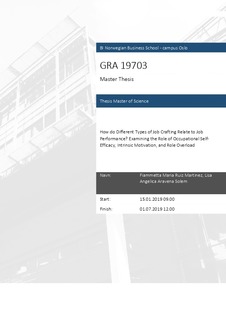How do Different Types of Job Crafting Relate to Job Performance? Examining the Role of Occupational SelfEfficacy, Intrinsic Motivation, and Role Overload
Master thesis
Permanent lenke
http://hdl.handle.net/11250/2623410Utgivelsesdato
2019Metadata
Vis full innførselSamlinger
- Master of Science [1621]
Sammendrag
This study looks into the relationship between distinct job crafting forms and leaderrated
performance, as well as job crafting’s predictive relationship to occupational
self-efficacy, intrinsic motivation and role overload. A cross-sectional study was
carried out, and a correlation analysis was used to examine the data. The study was
conducted at an individual level and the analysis consists of 84 employees and 40
leaders across 8 different companies in Norway. The findings partially support one
of the three job crafting-performance hypotheses, which suggests that the avoidance
job crafting form, decreasing hindering demands, is negatively related to task
proficiency. Contrary, approach forms of job crafting, increasing resources and
increasing challenges, were not related to performance. Further, increasing
challenges predicted intrinsic motivation and increasing resources predicted
occupational self-efficacy and intrinsic motivation. This study contributes to the
research field of job crafting by providing evidence that not all forms of job crafting
have a positive impact on employee’s performance. In addition, it serves as a
foundation for further research of the motives, impact and perceptions of job
crafting aimed at reducing hindering demands.
Beskrivelse
Masteroppgave(MSc) in Master of Science in Leadership and Organizational Psychology - Handelshøyskolen BI, 2019
